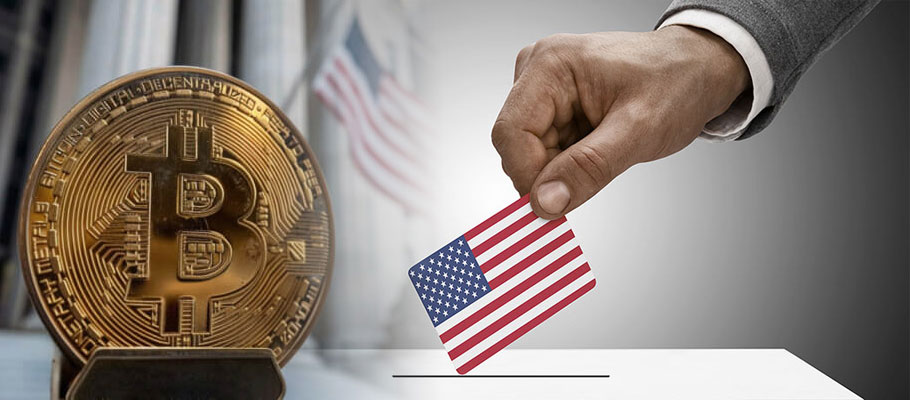
Published: November 6th, 2024
Bitcoin may not have been on the ballot this US election, but the world’s top digital asset has made its presence known throughout the recent campaign. Crypto has played a bigger part in mainstream media narratives and sent ripples across the political spectrum.
We tracked the most significant crypto-related political happenings during this US presidential election.
A crypto-friendly crowd was all cheers for Donald Trump in May when he promised to keep digital assets companies from fleeing the country at a Mar-a-Lago launch event for his latest NFT collection.
Republicans fell in line behind Donald Trump’s pro-crypto pivot in July, pledging to ‘defend citizens’ right to mine Bitcoin,’ while also adding protections for self-custody of crypto to its party election manifesto.
VP Kamala Harris referenced crypto for the first time in September during an address to the Economic Club of Pittsburgh, an apparently un-scripted move that surprised both supporters and critics.
In a speech at the BTC Nashville even in late July, Trump and independent candidate Robert F. Kennedy Junior promised to create a strategic Bitcoin stockpile for the US Federal Reserve.
In August, Trump revealed another crypto-related venture, a new DeFi platform called World Liberty Financial that (when it launches) promises to 'liberate the average American from big banks and financial elites.’
Kamala Harris committed to passing new regulatory legislation for crypto at a digital town hall meeting in August.
In September, Harris made waves by promising to support new digital asset rules designed specifically for Black men, so that ‘Black men who invest in these assets are protected.’
At a visit to a BTC-themed restaurant in Manhattan, Trump bought a round of burgers with Bitcoin for everyone in attendance. The stunt went viral on social media with video clips showing Trump using a smartphone to make the buy.
In July 2024, an analysis of foreign exchange movements by Barclay’s pegged recent USD advances to a growing belief amongst traders that Donald Trump was on track win the election.
In a note to investors, the bank’s FX strategy unit wrote that ‘we have seen USD rally twice recently following events that would seem to improve the chance of a Donald Trump win in the race for the US presidency. The most recent was a favorable Supreme Court ruling’.
In June 2024, the US Supreme Court ruled that former presidents can expect immunity from prosecution for official acts taken while they were in office (though they can’t expect immunity for unofficial acts).
‘It is now clear that traders perceive a link between Trump and a stronger dollar’.
The ruling meant that the Biden government’s election interference case against Trump went back to a lower court, which is still deciding how or if to continue the case. The delay cleared another hurdle for Trump's possible return to the White House.
Barclays analysts said the ‘Trump effect’ on USD is based on assumptions of lower taxes, higher growth, protectionism measures likely to aggravate inflation, and geopolitical uncertainty.
‘With the momentum seemingly favoring former president Trump’s bid for a second term, combined with forecasts that the Republican Party will take control of both the Senate and the House of Representatives, traders are now looking for reduced immigration, increased tariffs, and lower taxes.
‘The combined impact if these measures could lead to higher inflation, bigger deficits, and more activist policy by the US Fed.’
The Trump effect extends beyond fiat markets. Earlier in the election campaign, when the two major parties were conducting primaries to choose their respective Presidential candidates, former Republican contender Ron Desantis made an about-face on crypto policy.
He told supporters at a political rally that he would end the US government’s 'campaign of harassment’ against the crypto industry, signing a pro-Bitcoin decree on his first day in office if elected to the White House. The move was widely read as an appeal to Trump voters, who tend to be pro-crypto.
Speaking to a crowd during a campaign stop in New Hampshire, DeSantis, who is governor of Florida, said ‘Biden's battle to stop the rise of Bitcoin and cryptocurrency will cease immediately when I become president.’
DeSantis was fighting an uphill battle against Trump at the time as he sought the Republican Party nomination. In the past he had maintained an ambivalent attitude towards cryptocurrencies. The NEw Hampshire speech affirmed a positive view of crypto while criticizing the Biden administration’s push for a Central Bank Digital Currency (CBDC).
‘When I become President, plans for a US CBDC go straight into the bin. We will not allow it.’
Unlike cryptocurrencies, which are created and distributed privately, CBDCs would be issued by a country’s central bank and could be designed to limit or ban some transactions. As Florida Governor, DeSantis actually banned issuance of any federal CBDC within the state’s borders, saying it would be used as a mechanism for government surveillance and control.
After announcing his bid for the Republican presidential nomination, DeSantis joined Elon Musk in a Twitter Spaces broadcast to clarify his position on crypto. He said that citizens have 'the right’ to use Bitcoin. He said that he supports the technology personally, and that its existence is under threat if current US President Joe Biden is re-elected.
‘Bitcoin is a threat to the Democrats and their backers in traditional finance,’ DeSantis said at the time. ‘They want to regulate it out of existence.’
US crypto firms are already moving operations overseas to avoid American restrictions on banking access and regulatory clampdowns. Industry leaders like Coinbase and Grayscale have taken to the courts to fight Washington for the freedom to launch new products. Both firms say they also want more regulatory clarity.